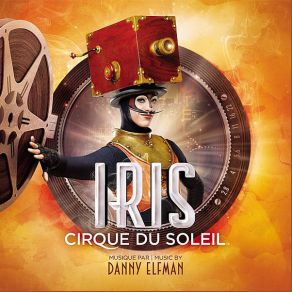Iris
Download links and information about Iris by Cirque Du Soleil. This album was released in 2011 and it belongs to New Age, World Music, Theatre/Soundtrack genres. It contains 17 tracks with total duration of 01:07:09 minutes.

|
|
|---|---|
| Artist: | Cirque Du Soleil |
| Release date: | 2011 |
| Genre: | New Age, World Music, Theatre/Soundtrack |
| Tracks: | 17 |
| Duration: | 01:07:09 |
| Buy it NOW at: | |
| Buy on iTunes $9.99 | |
| Buy on Amazon $5.89 | |
| Buy on Amazon $9.99 | |
Tracks
[Edit]| No. | Title | Length |
|---|---|---|
| 1. | Buster's Big Opening | 4:47 |
| 2. | The Twins | 4:58 |
| 3. | Kiriki Film | 1:29 |
| 4. | Kiriki | 5:24 |
| 5. | Silent Movie | 0:51 |
| 6. | Patterns | 4:51 |
| 7. | Clown Special Effects | 1:48 |
| 8. | Pellicule, Pt. 1 & 2 | 6:23 |
| 9. | Snake Women | 4:20 |
| 10. | Movie Studio | 7:03 |
| 11. | The Broom | 1:17 |
| 12. | Flying Scarlett | 4:43 |
| 13. | Old Toys | 0:45 |
| 14. | Film Noir / Pursuit | 3:34 |
| 15. | Rooftops | 4:55 |
| 16. | Scarlett Balancing | 5:09 |
| 17. | IRIS Finale and Bows | 4:52 |
Details
[Edit]It's the iris of a camera that Cirque du Soleil has in mind in the title of a show staged at the Kodak Theatre in Los Angeles (where they hold the Academy Awards) and devoted to the movies. Appropriately, the organization has gone out and hired a prominent film composer to write the show's score, and it's hard to imagine a more complementary one than Danny Elfman, who is known for his zany, manic work for the visually imaginative and somewhat arch director Tim Burton. Given the Hollywood theme, it's no surprise that this is one of the less exotic scores done for a Cirque presentation; Elfman does lean toward the exotic slightly on "Snake Women," in a nod to cinema's more adventurous aspects, but this is far from world music. The show has a "history of the movies" theme that allows the composer to provide his versions of the kind of Keystone Kops comedy of the early silents, notably in the fast-paced "Kinki Film" cue. Elfman also dips into the big-band swing style of braying horns and pounding percussion here and there, including in "Buster's Big Opening" and "Movie Studio." But both of those cues are extended suites that feature several different sections so that, just as in a film score, Elfman is accompanying quickly changing visual action. Late in the show, the story has moved on into the 1930s and ‘40s with "Film Noir/Pursuit," and the music has mysterious and late-night jazzy elements, followed by "Rooftops," which provides identifiable chase rhythms. This is thus an unusual score for Cirque as the organization continues to expand its horizons and partner with established artists, blending its identity and providing a new outlet for a composer who has made his mark in Hollywood and whose music listeners will recognize in this stage extravaganza.